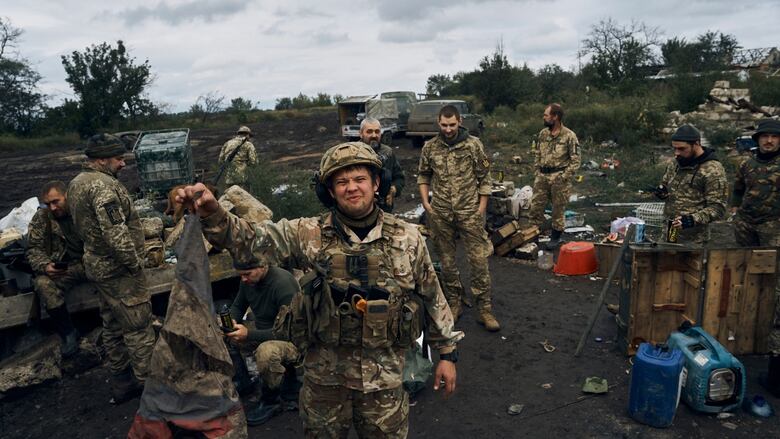Ukraine looks for security treaty to formalize wartime allied support
With Russian strategy in disarray, Kyiv seeks protection as it waits to join NATO

While Russia may be in retreat in northeastern Ukraine, the government in Kyiv has signalled once again that it's looking beyond the current war for long-term security guarantees from western allies — including Canada — while it waits to join NATO.
Those guarantees would include substantial weapons transfers, military training and binding defence commitments — a formalized extension of the wartime support Ukraine is getting now.
A report commissioned by Ukrainian President Volodymyr Zelenskyy — co-authored by former NATO secretary general Anders Fogh Rasmussen and Zelenskyy's chief of staff Andrey Yermak — was presented Tuesday in Kyiv.
The goal, the report says, is to prevent Russia from ever invading again.
Russia President Vladimir Putin used Ukraine's aspirations to join NATO as a pretext for unleashing the invasion last winter.
The new report pointedly does not set aside the country's ambitions to join NATO — the western military alliance whose members commit to treating an attack on one member as an attack on all.
"Both NATO and EU membership will bolster Ukraine's security in the long-term," the report said. "The guarantees outlined today in no way undermine these aims but will ensure that Ukraine has what it needs to defend itself under any circumstance."
The European Union put Ukraine on track for membership earlier this year. NATO signaled 14 years ago that it was interested in making Ukraine a member but has said in the years since that the country had not met all of the criteria.
'Ad-hoc' security commitments not enough: Kyiv
While Ukraine's membership in the alliance continues to be debated, the report recommends the creation of something it calls the Kyiv Security Treaty.
The treaty, says the report, would involve a core group of allies that "would make clear commitments to support Ukraine's armed forces, while a broader group would provide non-military guarantees built around sanctions mechanisms."
The report defines this core group of allies as the U.S., U.K., Canada, Poland, Italy, Germany, France, Australia and Turkey, along with Nordic, Baltic and Central European countries — in other words, most of NATO.
Zelenskyy's government was asking for security guarantees from allies in the run-up to last winter's invasion. At one point during the spring, he hinted the country might be willing to forgo the idea of joining NATO.
In a statement, Yermak said the interim step of a treaty is necessary to ensure Ukraine's future security because the improvised support throughout the war is not a sustainable model.
"With the help of allies, Ukraine is successfully resisting this onslaught," he added.
"However, it should be noted that decisions often had to be made ad-hoc and the development of mechanisms for this assistance required a lot of time, which is always lacking in war and which is bought with pain, blood and lives."
The report said Ukraine needs the resources "to maintain a significant defensive force capable of withstanding the Russian Federation's armed forces and paramilitaries."
It also needs "a multi-decade effort of sustained investment in Ukraine's defence industrial base," along with weapons and intelligence support from allies, the report added.
Ukraine also wants to see intensive military training missions and joint exercises under the European Union and NATO flags.
Rasmussen, who was secretary general of NATO between 2009 and 2014, said the adoption of such a treaty would both send a powerful signal to Russia and show the Ukrainian people that they have loyal partners in the West.
Fortress Ukraine
"Just now, Ukrainians are demonstrating on the frontline that, with the necessary resources, they can defeat Russia on the battlefield," Rasmussen said in a statement accompanying the report.
"Ukrainians demonstrate the will to fight, and the democratic world must continue to provide them with the means to fight. When this war is over, we must ensure that Russia can never invade Ukraine again."
Some defence analysts have said that — regardless of whether it joins NATO — a postwar Ukraine needs to become a "fortress" on its own.
Experts across the board agree that the war will continue for some time, although the success of the recent counter-offensive suggests Ukraine might actually drive Russia from its territory.
"Nothing seems impossible anymore. Or I shouldn't say impossible but implausible," said Dominique Arel, the chair of Ukrainian studies at the University of Ottawa.

While the war has been described at various times as a "stalemate" or "frozen conflict," he said, that "doesn't apply" any longer in Ukraine's east.
That assessment is shared by the Washington-based Institute for the Study of War, which said on Sunday that Russia has been handed a major defeat.
"Ukraine has turned the tide of this war in its favour," the institute said in its daily summary.
"Kyiv will likely increasingly dictate the location and nature of the major fighting, and Russia will find itself increasingly responding inadequately to growing Ukrainian physical and psychological pressure in successive military campaigns unless Moscow finds some way to regain the initiative."

